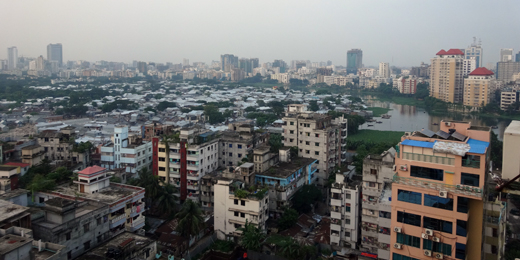[14 September 2018] -- Cities Alliance hosted a virtual learning exchange 3-7 September for the grantees of our 2015 Catalytic Fund call “Migration and the Inclusive City.” It is the final knowledge exchange for the Catalytic Fund, which is transitioning into a new Innovation Fund.
The exchange allowed the grantees to share experiences and network. It also enabled us to see the wide impact our seed-funding for projects has on the ground. Through the Catalytic Fund projects, migrants have become more aware of their rights, improved their livelihood opportunities and are better integrated into the city, in close contact with host communities and government.
The call funded 11 projects that sought innovative policy responses and practical approaches to increasing spatial, social, and economic inclusion by extending the rights to the city to migrants.
Although the projects took diverse approaches with different beneficiaries and activities, the thematic focus of the learning exchange provided a means of comparative analysis that made it possible for us to link the experiences to a wider context.
It comprised four webinars:
-- Capacity building of, and support systems for, migrants
-- Policy development and government responsiveness
-- Fostering social cohesion through creative approaches
-- Challenges and opportunities of multi-stakeholder approaches and working with local government
Each webinar had a thematic focus to allow projects to share their experiences in a specific area. This comparative analysis enabled the participants to identify and understand common challenges and opportunities.
Discussions turned around topics such as the challenges of collecting the sensitive data, ways to change the narrative on migration from negative to positive, and the importance of measuring project impact for policy-uptake.
Here are some examples of how the projects are tackling the challenges:
-- Engaging with local authorities and other stakeholders: In Buenos Aires, the local government organises cooking workshops to bring together different migrant women groups.
-- Collecting the right data: A city profile of Tripoli is helping decision makers understand the impact of the refugee crisis on cities and the most vulnerable neighbourhoods.
-- Changing the narrative on migrants: The Welcoming Bologna project in Italy started an online campaign to engage citizens with the topic of migration and an inclusive city.
-- Building the capacity of migrants: Oxfam Bangladesh offers skill and vocational training for female domestic workers.
-- Measuring impact: In Nigeria, the project tracks media articles and government statements to analyse changes in public attitudes towards migrants, and in Côte d’Ivoire, basketball training has improved students’ personal development and social cohesion of communities.
To ensure that the impact will be sustained in the long-run, the webinar series was followed by a professional training on project sustainability. This training comprised two additional webinars on sustainability challenges and opportunities, as well as bilateral coaching sessions for each project.
The Catalytic Fund migration projects
Here is a list of the 11 projects, organised by theme:
Social Inclusion and Integration
-- Argentina: Culinary workshops to foster cultural exchange among different migrant groups
-- Côte d’Ivoire: Basketball training and capacity building to foster social cohesion among youth from different ethnic groups
-- Italy: Urban taskforce from different city sectors to develop inclusive policy responses and city initiatives for migrant inclusion
-- South Africa: Community theatre and storytelling of women migrants’ stories to overcome xenophobia in Durban
Access to services, livelihoods and protection
-- Niger: establishment of central desk on basic services and capacity building to improve livelihoods of Malian refugee communities
-- Nigeria: Training of migrant community paralegals to offer free legal assistance to other migrants and engage with policy-makers
Labor market and economy
-- Bangladesh: empowering domestic workers through job matching, rights awareness, training, and advocacy work
-- Guatemala: First multi-stakeholder coordination on integration of involuntarily returned migrants through employment matching, job training, skill certification and seed funding
Inclusive planning and participatory governance
-- Jamaica: Participatory development of first national strategy on reintegration of involuntarily returned migrants
-- Lebanon: Pioneering an urban approach to refugee management in Lebanon through development of city profiles that assist local authorities in finding inclusive responses
-- Lebanon: Introduction of Right to the City concept to MENA region through development of the Beirut Right to the City Charter

A Catalytic Fund project by Oxfam Bangladesh offers skill and vocational training for female domestic workers.
The exchange allowed the grantees to share experiences and network, and it enabled us to see the wide impact our seed-funding for projects has on the ground.
Related Items:




